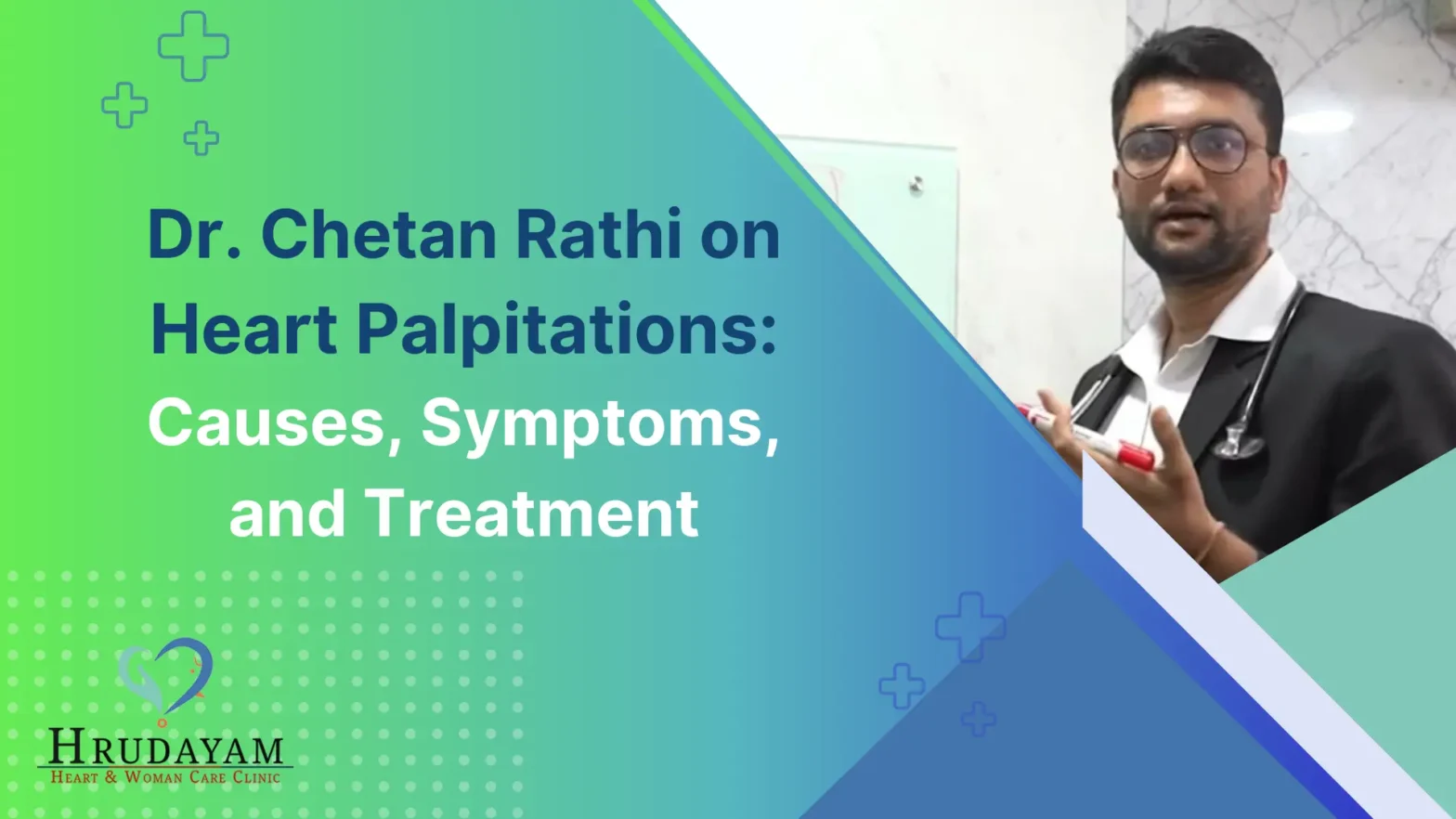Hrudayam Heart & Woman Care Clinic
Heart Palpitations: Causes, Symptoms, and Treatment
Heart Palpitations: Causes, Symptoms, and Treatment
Heart palpitations are often described as a feeling of an unusually fast, strong, or irregular heartbeat. While they are typically harmless, heart palpitations can sometimes signal an underlying medical condition. Understanding the causes, symptoms, and treatment options is essential for those experiencing palpitations or concerned about their heart health.

What Are Heart Palpitations?
Heart palpitations are the sensation of your heart beating irregularly, too fast, or sometimes too slow. You may feel as though your heart is pounding, fluttering, or skipping beats. Most palpitations are brief and occur in response to physical exertion, stress, anxiety, or stimulants like caffeine. In some cases, however, palpitations may indicate a more serious heart condition, such as arrhythmia or heart disease.
Common Causes of Heart Palpitations
- Stress and Anxiety: Emotional stress and anxiety are among the most common triggers for palpitations. When you’re anxious or stressed, your body’s “fight or flight” response can cause your heart to beat faster.
- Physical Activity: Exercise increases heart rate, which may lead to palpitations, especially if your body isn’t accustomed to the activity.
- Caffeine and Stimulants: Consuming too much caffeine, nicotine, or certain medications (like decongestants or weight loss pills) can overstimulate the heart, resulting in palpitations.
- Hormonal Changes: Hormonal fluctuations due to pregnancy, menstruation, menopause, or thyroid problems can lead to heart palpitations.
- Heart Conditions: Palpitations can sometimes be linked to heart issues such as arrhythmias, which cause irregular heart rhythms, or other conditions like heart disease, mitral valve prolapse, or electrolyte imbalances.
- Fever and Illness: A high fever, infections, or other illnesses can increase your heart rate and cause palpitations.
- Medications: Certain drugs, particularly stimulants, antidepressants, or blood pressure medications, can also lead to palpitations as a side effect.
- Dehydration and Low Blood Sugar: Lack of fluids or imbalanced blood sugar levels can affect your heart rate, leading to palpitations
Symptoms of Heart Palpitations
- A racing heart or pounding in your chest
- Fluttering sensations in the chest
- Dizziness or lightheadedness
- Shortness of breath
- Chest discomfort or pain (this warrants immediate medical attention)
- Fainting or feeling faint
If you experience any of these symptoms alongside palpitations, it’s important to seek medical advice to rule out any serious health conditions.
When to Seek Medical Attention
- Persistent palpitations that don’t seem to go away
- Palpitations associated with chest pain, fainting, or dizziness
- A history of heart disease or family members with heart conditions
- Sudden onset of palpitations without clear triggers
A healthcare professional may run tests, such as an ECG (electrocardiogram) or Holter monitor, to determine the underlying cause and suggest an appropriate course of action.
Treatment for Heart Palpitations
Treatment for heart palpitations depends on the cause. Here are some common options:
- Lifestyle Changes: Reducing stress, avoiding stimulants (like caffeine or alcohol), staying hydrated, and practicing relaxation techniques such as yoga or deep breathing can often help reduce or eliminate palpitations.
- Medications: If palpitations are linked to a medical condition, such as an arrhythmia or hyperthyroidism, medication may be necessary to control your heart rate or address the underlying issue.
- Electrocardiogram (ECG) and Monitoring: In some cases, doctors will use an ECG to monitor your heart’s electrical activity, ensuring that any irregularities are detected and managed.
- Cardioversion or Ablation: In more serious cases, treatments like electrical cardioversion or catheter ablation may be recommended. These procedures help reset or fix abnormal heart rhythms.
- Healthy Diet and Exercise: Regular exercise and a healthy diet can help promote heart health and reduce palpitations related to lifestyle factors like obesity or high cholesterol.
- Managing Anxiety: If anxiety is contributing to palpitations, therapy, medications, and stress management techniques can be beneficial.
Conclusion
Heart palpitations can be unsettling, but they are often harmless. If you’re experiencing palpitations frequently or with concerning symptoms, it’s essential to consult a healthcare provider for proper diagnosis and treatment. Understanding the causes, recognizing symptoms, and knowing when to seek help can ensure better heart health and peace of mind.
For those seeking more information about heart palpitations or related conditions, make sure to follow trusted medical sources and consult a doctor when in doubt. Taking control of your health today can help you manage palpitations and live a healthier, more comfortable life.
FAQs of Dyslipidemia
What are heart palpitations?
Heart palpitations refer to the feeling of an irregular, fast, or strong heartbeat. It may feel like your heart is pounding, fluttering, or skipping beats, but in many cases, they are harmless.
What causes heart palpitations?
Heart palpitations can be triggered by various factors such as stress, anxiety, exercise, hormonal changes, caffeine, medications, dehydration, or underlying heart conditions like arrhythmias.
Are heart palpitations serious?
In most cases, heart palpitations are harmless and temporary. However, if they are persistent, frequent, or accompanied by chest pain, dizziness, or fainting, it’s important to seek medical advice to rule out serious conditions.
How can I tell if my palpitations are related to anxiety?
Anxiety-induced palpitations typically occur during stressful situations and may be accompanied by other anxiety symptoms like rapid breathing, sweating, and feelings of nervousness. A doctor can help differentiate between anxiety and other causes.
What are the symptoms of heart palpitations?
Symptoms of heart palpitations include a racing or pounding heart, fluttering in the chest, dizziness, lightheadedness, shortness of breath, or chest discomfort. Severe symptoms may indicate a more serious issue and require medical attention.
